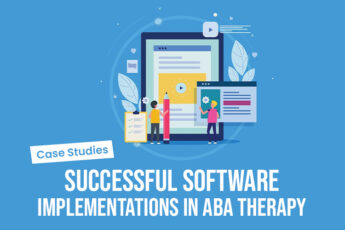The landscape of ABA therapy is rapidly changing, and at the forefront of this transformation stands telehealth. Gone are the days of solely relying on in-person sessions, as the integration of technology opens up exciting new possibilities for delivering effective and accessible ABA services. At DIBS, we believe in leveraging technology to empower individuals with autism and their families, and telehealth plays a crucial role in achieving this vision.
This blog explores the impact of telehealth on ABA therapy, highlighting its benefits, challenges, and the role of cutting-edge software in maximizing its potential.
Telehealth: Bridging the Gap in ABA Therapy
Telehealth, the delivery of healthcare services through telecommunication technology, has revolutionized various medical fields, and ABA therapy is no exception. It offers a range of advantages that benefit therapists, parents, and individuals receiving ABA services:
- Increased Accessibility:
Telehealth removes geographic limitations, enabling individuals in remote areas to access qualified ABA therapists. This transition from limited access to expanded opportunities brings therapy closer to those who need it most.
- Enhanced Engagement and Motivation:
Telehealth empowers therapists to personalize therapy sessions, catering to individual needs and preferences. Through the use of interactive tools and virtual environments, therapists can create engaging learning experiences. This transition from traditional therapy to interactive experiences, therefore, fosters greater engagement and motivation among clients.
- Data-Driven Insights and Collaboration:
Telehealth platforms integrate seamlessly with ABA therapy software, enabling therapists to collect and analyze data in real time, gaining valuable insights into client progress and adapting interventions accordingly. This transition from subjective observations to data-driven insights empowers therapists to make more informed decisions.
Challenges and Considerations:
While telehealth presents significant advantages, it’s important to acknowledge potential challenges and address them thoughtfully:
- Technological Barriers: Access to a reliable internet connection and appropriate devices is crucial for successful telehealth sessions. Ensuring equitable access to technology for all clients is essential.
- Maintaining Therapeutic Connection: Building strong rapport and establishing trust is essential in ABA therapy. Therapists must adapt their communication styles and utilize strategies to foster a meaningful therapeutic connection over video conferencing platforms.
- Privacy and Security: Data security and patient privacy are paramount in telehealth. Ensuring the use of HIPAA-compliant platforms and implementing robust security protocols is crucial to protect sensitive information.
The Role of ABA Therapy Software
To overcome these challenges and maximize the benefits of telehealth, sophisticated ABA therapy software is indispensable. DIBS Custom Software Development specializes in creating user-centric platforms that seamlessly integrate with telehealth functionalities:
- Secure Communication and Data Sharing: Software should provide a secure platform for video conferencing, text-based communication, and file sharing, while maintaining compliance with HIPAA regulations.
- Interactive Learning and Data Collection: The software should incorporate engaging games, virtual activities, and tools for real-time data collection, allowing therapists to track progress, analyze data, and personalize therapy sessions.
- Remote Supervision and Collaboration: Software should enable remote supervision and collaboration between therapists, supervisors, and other professionals, ensuring quality care and ongoing support.
- Accessibility and Usability: The platform should be user-friendly for both therapists and clients, with intuitive interfaces, adaptable settings, and accessible features for individuals with diverse abilities.
Conclusion: Embracing a Brighter Future Telehealth in ABA therapy is not merely a trend, but a significant shift that has the potential to transform the lives of individuals with autism and their families. DIBS is committed to empowering therapists and families by embracing innovative technology and collaborating with software development experts. This partnership, therefore, allows us to navigate this exciting new frontier in ABA therapy. As a result, we continue to refine and expand the capabilities of our software, and, in turn, we remain dedicated to creating a future where ABA therapy is accessible, engaging, and effective for everyone.







Leave a Comment